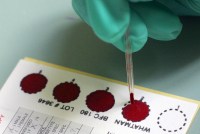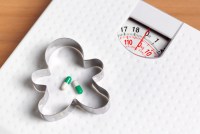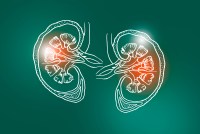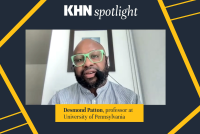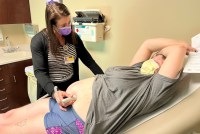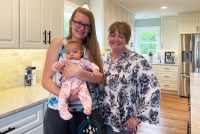Latest KFF Health News Stories
Newborns Get Routine Heel Blood Tests, but Should States Keep Those Samples?
Shortly after birth, babies are pricked in the heel so their blood can be tested for life-threatening conditions. States generally save leftover blood from those samples, and parents and privacy experts are concerned that information could be used without consent years later.
California and New York Aim to Curb Diet Pill Sales to Minors
California and New York would be the first states to require anyone under 18 to obtain prescriptions to purchase over-the-counter weight loss products, which some research has linked to eating disorders.
‘He Stood His Ground’: California State Senator Will Leave Office as Champion of Tough Vaccine Laws
California state Sen. Richard Pan, who spearheaded some of the country’s most ambitious vaccine mandate legislation, is leaving office this year because of term limits. A pediatrician, he plans to practice medicine full time but has not ruled out a future run for office.
For Kids With Kidney Disease, Pediatric Expertise Is Key — But Not Always Close By
A study published in JAMA leads to questions about the uneven distribution of pediatric nephrologists nationwide. Children with end-stage kidney disease feel the impact.
More Communities Are Giving Flavored Tobacco the Boot. Will California Follow?
San Jose and Sacramento this summer joined scores of other California cities and counties that have banned the sale of flavored tobacco products such as menthol cigarettes and candy-flavored e-cigs. In November, California voters will decide whether to allow a statewide ban to take effect.
Cada vez más comunidades rechazan el tabaco aromatizado. ¿Es el turno de California?
Aunque comunidades grandes y pequeñas de todo el estado ya han actuado, los californianos decidirán en noviembre si promulgan una de las prohibiciones estatales más completas del país sobre el tabaco aromatizado.
‘Children Are Not Little Adults’ and Need Special Protection During Heat Waves
Public health experts say heat waves pose health risks for children, whose bodies may not be as effective at cooling and who rely on caretakers to prevent and notice the signs of heat-related illness.
Citing a Mental Health Crisis Among Young People, California Lawmakers Target Social Media
Legislators are considering two bills that address online addiction among children by taking aim at website features such as push notifications and targeted posts. But Big Tech is fighting the effort, saying companies are already taking steps to protect children.
KHN’s ‘What the Health?’: Manchin Makes a Deal
In a rare surprise for official Washington, Senate Majority Leader Chuck Schumer and Sen. Joe Manchin (D-W.Va.) announced a deal to expand the planned health bill in the Senate to include provisions raising taxes and addressing climate change. The measure would include a third year of expanded subsidies for the Affordable Care Act, but not health care coverage for people left out of Medicaid in states that failed to expand the program. Meanwhile, the ACA goes back to court, and the Biden administration restores anti-discrimination protections for LGBTQ+ people that were rolled back by the Trump administration. Joanne Kenen of the Johns Hopkins Bloomberg School of Public Health and Politico, Sarah Karlin-Smith of the Pink Sheet, and Alice Miranda Ollstein of Politico join KHN’s Julie Rovner to discuss these issues and more. Also this week, Rovner interviews Dr. Céline Gounder of KHN about the latest on the monkeypox outbreak.
Watch: Navigating Social Media After Mass Shootings
A University of Pennsylvania professor shares advice on navigating the intersection of gun violence and social media as part of KHN’s new “Spotlight” interview series.
‘So Rudderless’: A Couple’s Quest for Autism Treatment for Their Son Hits Repeated Obstacles
Amparo and Victor Rios began searching for answers about their son’s development when he didn’t hit some milestones after turning 2. Three years later, they are still trying to get their insurance to pay for expensive therapy to help him.
Parents Become Drug Developers to Save Their Children’s Lives
Families affected by ultra-rare diseases are starting their own companies to speed the development of treatments for their kids, venturing into territory that traditional drugmakers deem too risky.
Nurse Midwives Step Up to Provide Prenatal Care After Two Rural Hospitals Shutter Birthing Centers
Dozens of Iowa hospitals have closed their birthing units. A team of University of Iowa nurse midwives can’t reopen them, but they’ve found a way to provide prenatal checkups and other crucial services in two towns.
Kids Want to Put Montana on Trial for Unhealthy Climate Policies
Sixteen children and young adults are suing the state over energy policies they say are hurting their health and environment. The flooding that closed Yellowstone National Park may show they have a point.
The Search for Scarce Formula Is Worse for Rural Families on WIC
Constraints imposed by the Special Supplemental Nutrition Assistance Program for Women, Infants, and Children, known as WIC, that prevent recipients from using benefits to buy formula across state lines weigh on families as the nationwide formula shortage drags on.
KHN’s ‘What the Health?’: Closing In on Covid Vaccines for ‘The Littles’
The wait is nearly over for parents of kids under 5 as a key advisory committee to the FDA recommends authorizing a covid-19 vaccine for the youngest children. Meanwhile, Congress is struggling to fill in the details of its gun control compromise, and, as the Supreme Court prepares to throw the question of abortion legality back to the states, the number of abortions has been rising. Shefali Luthra of The 19th, Sarah Karlin-Smith of the Pink Sheet, and Sandhya Raman of CQ Roll Call join KHN’s Julie Rovner to discuss these issues and more. Plus, for extra credit, the panelists recommend their favorite health policy stories of the week they think you should read, too.
Double Shifts, Credit Card Debt, and Family Loans When Twins Were Born Early
One Chicago woman gave birth to twins 10 weeks prematurely, and the children needed extensive care. The medical bills topped out at around $80,000. Desperate, the parents loaded up credit cards, borrowed from relatives, and delayed repaying student loans.
It’s Hot Outside — And That’s Bad News for Children’s Health
An article in the New England Journal of Medicine takes a sweeping look at how heat — which can be a byproduct of air pollution and climate change — adversely affects people’s health, especially that of kids.
States Fight Student Mental Health Crisis With Days Off
In early 2022, Illinois joined a growing number of states where lawmakers and school leaders are trying to combat the ongoing student mental health crisis by granting days off for mental health needs.
Covid Funding Pries Open a Door to Improving Air Quality in Schools
Researchers say the billions in pandemic funding available for ventilation upgrades in U.S. schools provides a once-in-a-generation opportunity to combat covid-19, as well as making air more breathable for students living with allergies, asthma, and chronic wildfire smoke.



